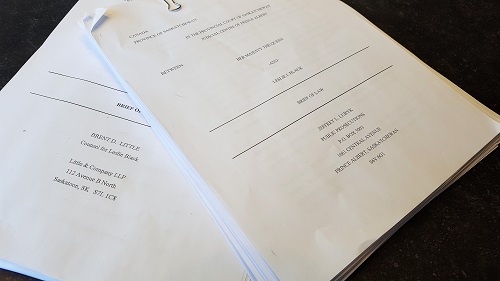Written arguments submitted by the Crown and defence. Photo by Chelsea Laskowski.
Some of the most graphic non-fatal crimes in Canada are cited in the final arguments in the Prince Albert dangerous offender hearing for Leslie Black’s attempted murder of Marlene Bird.
MBC has gained access to more than 100 pages of written arguments in the case, which Judge S. Loewen is currently pondering in advance of making a late August sentencing and dangerous offender decision. Prosecution’s arguments in support of a DO designation hinge on a finding that any of Black’s behaviour associated with the attack shows he is unlikely to refrain from such violence in the future, which defence argues has not been proven.
While there is no dispute that Black’s headline-grabbing summer 2014 beating and burning of Bird – which forced the amputation of her legs and loss of an eye – is brutal, defence lawyer Brent Little argues the length of that attack is significantly lower than those of Alberta’s Dustin Paxton who beat his roommate daily over the course of 18 months, or BC’s David Bobbitt who sexually assaulted and confined a woman for 24 hours. Little also argues that Black shows distress over the impacts of his crime and that Black feels remorse – unlike Paxton or Bobbitt who are both now labeled as DOs – whereas prosecutor Jeff Lubyk says Black “denied the offence to which he pled guilty and appears to be uninspired in his resolve.”
Lubyk requests an indeterminate sentence that would take the decision on whether to release Black from prison out of the court’s hands and into the hands of the Parole Board of Canada.
The Criminal Code requires Loewen to find that Black is “unlikely to be inhibited by normal stands of behavioural restraint” in the future. Lubyk argues that Black has never understood “normal” as most people experience it due to a life on the fringes of society: Black has “a history of housing issues, no employable skills, significant unaddressed substance abuse issues, no close relationships, a traumatic childhood.”
Meanwhile, defence says Black’s violence puts him in the realm of a long-term offender, not a dangerous offender. “Black needs stability in order to be managed in the community, but a stable residence would be available to him under the terms of a long-term supervision order,” Little writes. In court on Friday, he suggested a life sentence with between 10 to 15 years in prison and a 10-year long-term supervision order.
Black has been in custody since June of 2014 and a decision will be rendered in late August.
